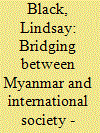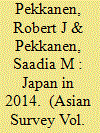| Srl | Item |
| 1 |
ID:
123111


|
|
|
|
|
| Publication |
2013.
|
| Summary/Abstract |
Numerous academic works have critiqued Japan's Official Development Assistance (ODA) programme for being mercantilist and failing to promote democratization and human rights (Orr 1990; Rix 1993; Arase 1995, 2005). Such accounts assess Japan's ODA policy from Western theoretical perspectives that advocate Western approaches, such as military and economic interventions to contain repressive states. While receptive to these criticisms, Japanese policy-makers have perceived their country's international role in 'bridging' (kakehashi) terms and structured their ODA accordingly, as this paper details in the case of Japan's ODA policy towards Myanmar. 1
The rationale behind Japan's kakehashi approach lies in the construction of Japan's self-identity as a state able to reenter international society after World War II through focusing on economic development rather than military and coercive action. Proponents of the kakehashi approach construct Japan both as a model of successful democratization through development which other states can learn from, as well as the means through ODA to 'bridge' the divide between repressive regimes and liberal democratic capitalism. This critical approach examines Japan's kakehashi or bridging strategy in terms of Japan's response to the anti-government protests in September 2007, Cyclone Nargis in May 2008, and in the build up to parliamentary elections in November 2010 in Myanmar to demonstrate the permanence of this approach in spite of a change of government in Japan. In so doing, the kakehashi approach reveals opportunities to engage with, rather than contain, repressive regimes, thereby raising the possibility of enticing such states back into international society though economic incentives.
|
|
|
|
|
|
|
|
|
|
|
|
|
|
|
|
| 2 |
ID:
137905


|
|
|
|
|
| Summary/Abstract |
It was all about Abe in 2014. With few intra-party challengers, a divided and weak opposition, and a huge victory in a December snap election gamble, Japan’s Prime Minister Abe finds unusual scope to lead the nation both domestically as well as internationally in his chosen course of ‘‘proactive pacifism.’’
|
|
|
|
|
|
|
|
|
|
|
|
|
|
|
|